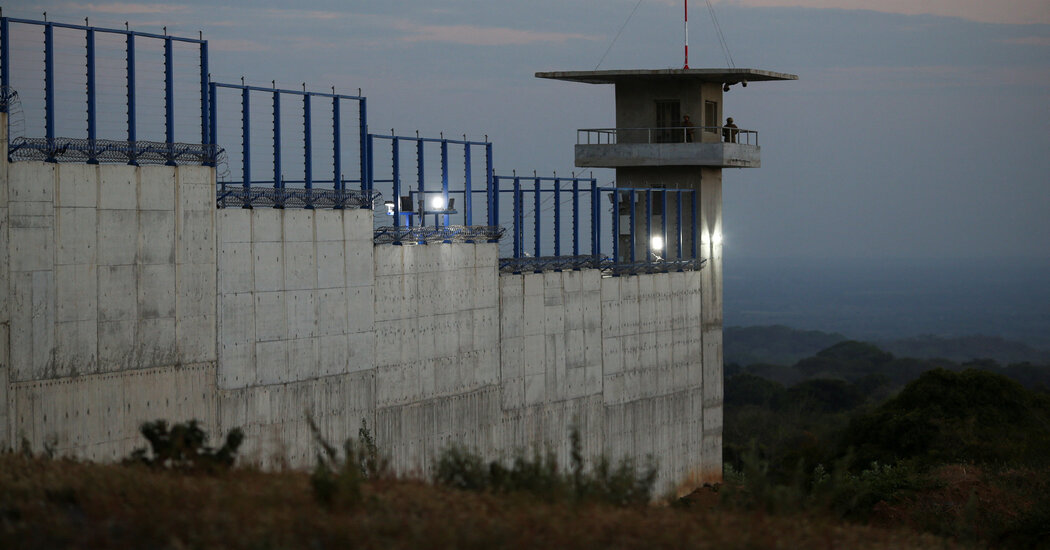The Trump administration on Tuesday asked a federal appeals court to block a lower court’s order directing the Trump administration to provide due process to scores of Venezuelan immigrants who were deported without hearings to El Salvador in March under a wartime law.
The emergency request by the Justice Department, filed to the U.S. Court of Appeals for the District of Columbia, came one day before the administration was supposed to send the lower court judge its proposal for how to allow nearly 140 of the deported Venezuelans to challenge their expulsion. The men, accused of being members of a violent street gang called Tren de Aragua, are being held in a maximum-security Salvadoran prison.
The White House deported the men on March 15 on a series of flights, using a powerful 18th-century statute known as the Alien Enemies Act. That law, which has been used on only three occasions in U.S. history, is meant to be used in times of declared war or during an invasion by a foreign nation.
The fight over the Venezuelans is merely one of the many bitter battles that have pitted courts across the country against an administration that is aggressively seeking to deport as many as immigrants as possible through methods that have repeatedly strained the boundaries of the law. Time and again, judges have settled on a similar bottom line, saying that the immigrants must be afforded basic due process rights before being expelled from the country.
The proceeding in front of Judge James E. Boasberg, the chief judge in Federal District Court in Washington, was one of the first deportation cases to reach the courts and remains one of the hardest fought. The judge tried to stop the deportation flights carrying the Venezuelans shortly after they took off, but the administration went ahead anyway, prompting him to threaten Trump officials with contempt proceedings.
Ever since the men landed in El Salvador, their lawyers have been seeking another order to bring them back to the United States. And last week, Judge Boasberg gave them some of what they wanted, directing Trump officials in an outraged decision to give the men the due process they were denied, but leaving it up to the administration to offer an initial plan about how to carry out his instructions.
Instead of doing so by their Wednesday deadline, lawyers for the Justice Department asked both the appeals court and Judge Boasberg himself to put everything on hold as they challenged his underlying instructions. They claimed he lacked the jurisdiction to tell the U.S. government what to do with men in the custody of a foreign nation, saying that his original order interfered “with the president’s removal of dangerous criminal aliens from the United States.”
The Supreme Court has already weighed in on the case, ruling in early April that the Venezuelan men had to be afforded the opportunity to contest their deportations, but only in the place where they were being held and only through a legal process known as a writ of habeas corpus. A habeas writ allows defendants to emerge from custody and go to court to challenge their detention.
But the Supreme Court’s decision raised a crucial question: Who, under the law, has custody over the Venezuelan men?
Their lawyers claimed that the Trump administration had what is known as “constructive custody” over them because they were being held in El Salvador under an agreement between the White House and Nayib Bukele, the Salvadoran president.
The Justice Department disagreed, arguing that the men were in the sole custody of El Salvador and were therefore beyond the reach of orders issued by an American federal judges.
In his order last week, Judge Boasberg sided with the department, saying that he could not fully refute the administration’s claims, even while expressing skepticism that the claims were true. Still, he used a different rationale to order the White House to figure out a way to give the Venezuelans a way to seek relief, saying that the Constitution demanded they be provided with some sort of due process.
It was that rationale with which the Justice Department took issue in its request to the appeals court to put the case on hold. Lawyers for the department assailed it as “unprecedented, baseless and constitutionally offensive.”
“The district court’s increasingly fantastical injunctions continue to threaten serious harm to the government’s national-security and foreign-affairs interests,” the lawyers wrote.
The case in front of Judge Boasberg was playing out as a related matter unfolded in a separate federal appeals court that is considering the broader question of whether President Trump has been using the Alien Enemies Act lawfully in the first place. That case is scheduled to have oral argument in New Orleans at the end of the month.


